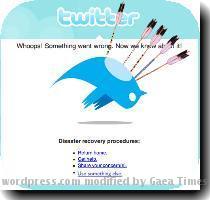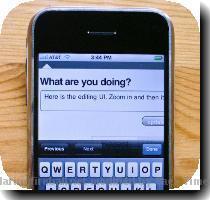Tuning in to tune out: Social networking revolutionizes the way we connect _ but at what cost?
By Martha Irvine, APWednesday, December 9, 2009
Decade of tweets, friends and hands across the Web
Picture a preschooler running through a grassy field next to her house, pretending she’s holding a friend’s hand.
That was my attempt at social networking, way back when I made up an imaginary playmate after my best buddy Linda moved away and broke my heart. With no kids left in my rural neighborhood, a girl had to do what a girl had to do.
I craved connection, even then.
Now, decades later, I’ve got more connection than I often know what to do with — hundreds of friends, and friends of friends, and people I’ve never met who’ve become my virtual acquaintances on various social networking sites.
Sure, it can be an efficient, effective way to communicate. But frankly, it also can make my head feel like it’s going to explode. (As I type this, I try not to be distracted by the instant notifications from my e-mail account telling me that so-and-so and so-and-so are now “following” me on Twitter.)
Wait. What was I talking about?
Oh yeah, the online social craze of the decade.
It’s not that I dislike communicating. Far from it.
In the 1980s, I was a fan of the handwritten letter. By the ’90s, I often used e-mail because it was easier and more immediate. This decade, despite my best intentions, my communications have gotten increasingly short, often circulated on Facebook, Twitter or by text message. Like I said, efficient, effective — but not without a price.
Consider the cheeky friend who recently described me this way: “She communicates with thousands of people at a time. It’s just her way.”
That comment partly stems from what I do for a living. But as technology has expanded our ability to communicate with more people, I’m receiving more of these little jabs from family and friends, many who knew me before e-mail or social networking existed.
I find their comments a tad hypocritical since a lot of them are social networkers, too. But that is the irony of our times: we’ve never been more connected, at least by gadgets, and yet many of us crave the undivided attention of our friends, family, bosses and co-workers.
We want simplicity, balance and a chance to concentrate, even as our electronic connectedness — self-imposed and otherwise — increases.
For me, social networking started innocently enough after doing the 1990s chat room and online forum thing. Early this decade, I dabbled very briefly in sixdegrees.com and then Friendster (yes, as uncool as that is now, I’ll admit it). My habit became more serious with MySpace, which I now lovingly call the “bellbottom pants” phase of my social networking experience.
Then Facebook really hooked me. And Twitter is now doing its best to suck me in, partly because I’m told that in these uncertain times, any journalist would be a fool to ignore it.
It’s all been useful for one reason or another. Occasionally, I’ve found sources for articles and spotted status updates or “trending topics” that have sparked story ideas.
I’ve also felt the power of social networking as a busy working parent who has less time than I’d like to connect with people.
I’ve learned about friends’ breakups, their children’s illnesses or parents’ deaths, sometimes more quickly than I would through more traditional means. I’ve gotten an inside glimpse of my nieces’ and nephews’ lives that I probably never would have, and a better sense of the day-to-day lives of close friends who live far away and even those who work in my own office.
I’ve found long-lost friends and made a couple new ones.
All that is great, invaluable, addictive even.
But I’ve also never felt more distracted, and that I don’t like.
How many among us have had a kid, a significant other or a friend ask us to put away a computer or a cell phone? How many of us have spent time staring at a computer screen or a gadget when we could be doing any number of things that we know would be better for us?
I know I have.
Don’t get me wrong. I still think there’s a lot to like about social networking. And even if I didn’t, there’s no denying that it’s forever changed the way we communicate.
I think it’s no coincidence, though, that to “unfriend” — essentially dropping a connection with someone made on Facebook — is the Oxford American Dictionary’s 2009 Word of the Year as this decade of frenzied communication comes to a close. On Twitter, the term is to “unfollow.”
People like me are tired of feeling frazzled and overextended. In these times of great change and upheaval, they’re prioritizing, on and offline , for survival and sanity.
Next decade, I’m vowing to be among the limit-setters, technological and otherwise.
Otherwise, you may see me running off in a field, mumbling to myself or to that imaginary friend.
And this time, that won’t be cute.
Martha Irvine is an AP national writer. She can be reached at mirvine(at)ap.org or via twitter.com/irvineap
Tags: Computing And Information Technology, Internet Technology, Relationships



Templates for newsletters